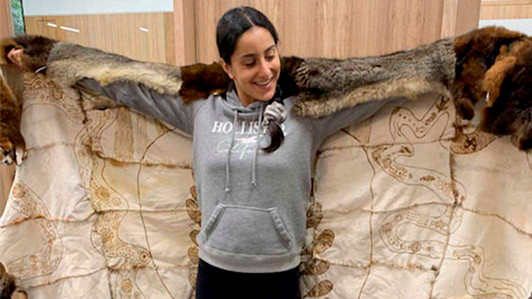Humanities
Co-op is optional for students studying:
- English
- French and Francophone Studies
- Gender Studies
- Germanic/Slavic Studies
- Greek/Roman Studies
- History
- Hispanic/Italian Studies
- Humanities - general studies
- Indigenous Studies
- Intercultural Studies and Practice
- Latin American Studies
- Linguistics
- Medieval Studies
- Pacific & Asian Studies
- Philosophy
- Religion, Culture & Society
How co-op works
Co-op gives you hands-on paid work experience related to what you're studying. It's the perfect way to develop your skills and find a career you love.
Learn more about what co-op is, how it works with your degree, and what to expect as a co-op student.
How to join
You'll join co-op beginning in your second year.
For optional co-op programs, you can apply to join co-op between June 9 and September 19 (the last day to add classes).
To join, you must:
- be registered in at least one of the following:
- degree program (BA, BSc) in the Faculty of Humanities
- English Minor in Professional Communication
- Intercultural Studies and Practice (diploma)
- Cultural Resource Management Program
- have completed your first year of study
- have a minimum B average
- be a full-time UVic student
- enrol in HUMA 201 either in the Fall or Spring term (Humanities graduate students are also eligible for co-op and will register for HUMA 501). Registration is open for the Spring intake. Register by January 10. Please note: If you have completed IS 310D: LE,NONET Preparation Seminar or another course equivalent to Introduction to Professional Practice, please contact us directly for admission.
International students: we recommend registering for the Fall HUMA 201/501 course to allow time to apply for your co-op work permit before your first work term.
After registering for HUMA 201 or HUMA 501, you'll be invited to complete the Humanities and Fine Arts Co-op Program Application. You'll receive confirmation of your acceptance into the program from the Humanities and Fine Arts co-op coordinator.
Once you're accepted
You will begin your co-op education through HUMA 201: Introduction to Professional Practice classes, which you'll take once before your first work term. Graduate students will complete HUMA 501: Introduction to Professional Practice classes.
Your course include 8 in-person, synchronous sessions, along with readings and assignments.
The goal of the course is to give you baseline tools and skills to help you in your co-op (and later, full-time) job hunt. You'll learn about the hiring process, passive and active search options, résumé and cover letter writing, professionalism and ethics, interview skills, networking skills and how to be successful on your work term.
Workshop times:
- Fall 2024: Fridays 2:30 p.m. – 3:20 p.m. (October 4 – November 22)
- Spring 2025: Friday 2:30 p.m. – 3:20 .p.m. (January 17 – March 7)
Program formats
The following program formats are available:
- co-op (traditional format)
- work experience program
- parallel co-op (part-time)
- post-study internship
- entrepreneurial co-op
Read more about these co-op formats.
Fees
Co-op students pay a co-op tuition fee for each work term. It's free to join co-op and attend the preparation course—you'll pay your tuition fee after you secure a co-op work term.
You'll pay your fees according to the same tuition fee deadlines as regular course fees.
Fees per work term for undergraduate students:
- domestic students: $807.56
- international students: $1,696.74
Fees per work term for graduate students:
- domestic students: $807.56
- international students: $1,015.71
Note that the graduate co-op tuition fee is different than the graduate installment fee. If you are a grad student and register for a co-op work term, during that term, you'll pay:
- the grad co-op program fee
- the grad ancillary fees
If you register for a course (e.g. thesis 596 or 598) and a co-op work term in the same term, during that term, you'll pay:
- the grad co-op program tuition fee
- the course tuition fee
- the grad ancillary fees
Questions about co-op tuition fees? Email us or call 250-721-7032 for assistance.
Average salaries
You'll receive a salary from your employer during each co-op work term. Co-op salaries vary according to:
- your previous work experience
- the industry you're working in
- the responsibilities of your co-op job
Here is an average monthly salary for a work term for a humanities student:
- undergraduate: $3,068.32
- graduate: $3,934.88
Work terms
Co-op work terms begin in January, May and September and are typically 4 months long.
- undergraduate co-op: 3 work terms (4 or 5 optional)
- work experience program: 1 or 2 work terms
- Master's students: 2 work terms
- PhD students: 3 work terms
- Continuing Studies Diploma: 1 work term
Learn more about:
Sample employers & jobs
During your co-op terms, you could work for:
- government (municipal, provincial or federal)
- theatres
- galleries
- libraries
- arts groups
- non-profit organizations
- newspapers and publishers
- private companies (all sizes)
Job examples:
- box office coordinator—Victoria Jazz Society
- junior analyst—Government of Canada
- multimedia coordinator—Pacific Peoples’ Partnership
- production and editorial assistant—Harbour Publishing
- programming assistant—Maritime Museum of BC
- technical writer—SAP
Angelina Schwarz (history and European studies)
UVic history and European Studies co-op student Angelina Schwarz’s internship at the Directorate-General for International Partnerships (DG INPTA), opened doors for her to explore the...
Ashley MacLellan (English and professional communication)
English and Professional Communications student Ashley Maclellan began her professional career after connecting with Civilian Human Resources at the Department of National Defence during the Mock...
James Coe and Matthew Kerr (history)
UVic history students James Coe and Matthew Kerr spent a summer bringing history to life at the Canadian Forces Base Esquimalt Naval and Military Museum. From giving tours to curating their own...
Jay Choi (Indigenous studies)
Jay Choi was first drawn to UVic from his home in South Korea because he loves the city. As a student in the humanities, his major in Indigenous studies and minor in Pacific and Asian...
Lisa Schnitzler (English and Indigenous studies)
UVic English and Indigenous studies student Lisa Schnitzler travelled to Australia during her work term to join the policy and impact team with the Office of Indigenous Education and Engagement at...
Shireen Foroghi (political science)
Indigenous and political science co-op student travelled to Australia for work term at Walanga Muru - Macquarie University.
Sydney Moore (Indigenous studies and Canadian history)
Sydney Moore is an Indigenous Studies and Canadian History student, who is Métis, mixed with Anishinaabe, Cree and French ancestry. Born and raised on the unceded territories of...
Office & contacts
Our regular business hours are Monday to Friday, 8:30 a.m. to 4:30 p.m.
Main office: Clearihue D128
Co-op coordinator:
Jeremy Pearce
jeremydp@uvic.ca
250-721-7629
Co-op assistant:
Laura Alcaraz-Sehn
hufacoop@uvic.ca
250-721-8841
Get support
We're here to support you with every step in your co-op journey, from applying to co-op to making sure you're supported at work. Contact your co-op coordinator or office for assistance.
If you identify as having a disability or a mental health condition, if you belong to an equity group, or if you identify as Indigenous, we have additional supports for your co-op experience.







